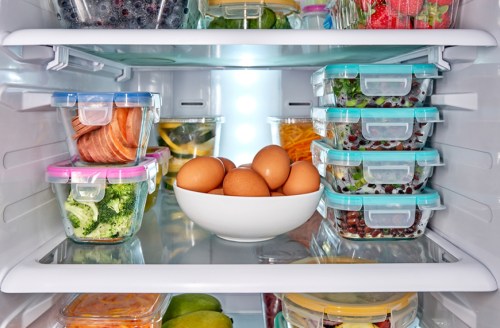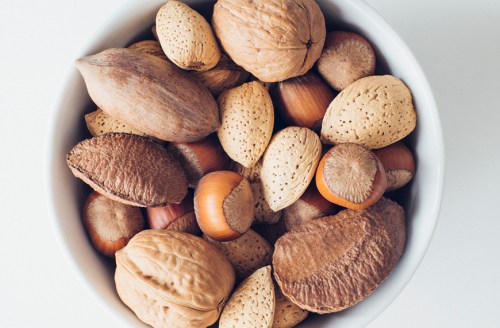6 Foods You Should Always Have in Your Refrigerator, According to a Longevity Expert
According to the Blue Zones founder Dan Buettner, your refrigerator is a good place to start stocking foods for longevity.

Eating healthy doesn’t have to be complicated. There’s not a long list of rules you need to follow, or a complicated diet plan to stick to. Just ask one of the many centenarians living in the Blue Zones, who will tell you a big part of living a long and happy life is enjoying a wholesome, plant-forward diet. And your refrigerator is a good place to start stocking foods for longevity.
Experts in This Article
Blue Zones expert and author of The Blue Zones Secrets for Longer Living
registered dietitian and author of The Better Period Food Solution.
Through his research, Dan Buettner, longevity expert and author of The Blue Zones Kitchen, has found it’s mostly about making healthy choices every day that, together, add up to a pretty amazing life. “None of the Blue Zones centenarians I’ve ever met tried to live to 100. No one said at age 50, ‘You know what, I’m going to get on that longevity diet and live another 50 years!’ They don’t count calories, take vitamins, weigh protein grams, or even read labels. They don’t restrict their food intake—in fact, they all celebrate with food,” says Buettner. “As we have applied the wisdom of the world’s Blue Zones diet to transform cities in the United States, I’ve begun to believe that we can create the same sort of culture here.”
Turning your home into a Blue Zone can be as simple as keeping your refrigerator, freezer, and pantry stocked with healthy staples to promote longevity.
The best refrigerator foods for longevity
1. Nuts

According to Buettner, nut-eaters outlive those who don’t eat nuts. Because of that, he’s a big proponent of eating a handful—aka two ounces—of mixed nuts a day. “Nuts come in a variety of flavors, and they’re full of nutrients and healthy fat that satiate your appetite,” says Buettner. “Small quantities are best, since the oils in nuts degrade (oxidize). Larger quantities can be stored in the refrigerator or freezer for a couple of months.”
2. Vegetables
Buettner says 95 percent of the food you eat should be plant-based.”In the Blue Zones, people eat an impressive variety of garden vegetables when they are in season, and then they pickle or dry the surplus to enjoy during the off-season,” he says. “The best of the best longevity foods in the Blue Zones diet are leafy greens such as spinach, kale, beet and turnip tops, chard, and collards.” The Blue Zones also recommends broccoli, Brussels sprouts, cabbage, cauliflower, and peppers—really, anything you like.
3. Fruit
Fresh fruit is another Blue Zones refrigerator staple. “Think apples, melons, grapefruit, oranges, and clementines. Fruit that lasts a long time,” he says. You can also keep bananas in your fridge. He says doing so when they’re almost ripe will make them last longer. Aside from filling your fridge with fruit, placement is also key. Buettner recommends keeping your fruit (as well as your veggies) on the top shelf of your refrigerator, as doing so puts them at eye level and encourages you to eat more of them.
4. Tofu
Animal protein is limited when you’re eating like you live in the Blue Zones. “Designate two days a week when you eat meat or other animal-derived food—and enjoy it only on those days,” Buettner says. Instead, opt for plant-based protein, like beans in your pantry and tofu in your fridge. “Find plant-based substitutes for the meat Americans are used to having at the center of a meal,” he says. “Try lightly sautéed tofu, drizzled with olive oil, or tempeh.” There are so many different ways you can use tofu, too, all of which are anything but boring.
5. Fish

While meat is limited, Buettner says you can eat up to three ounces of fish daily, as those who ate a plant-based diet that included small portions of fish lived the longest. “Favor mid-chain fish like trout, snapper, grouper, sardines, and anchovies,” he says. “And steer clear of ‘farmed’ fish, as they are typically raised in overcrowded pens that make it necessary to use antibiotics, pesticides, and coloring.”
6. Alt-milk
Dairy should be reduced when you’re eating a Blue Zones diet. “While Americans have relied on milk for calcium and protein for decades, in the Blue Zones diet people get these nutrients from plant-based sources,” Buettner writes. “One cup of cooked kale or two-thirds of a cup of tofu, for instance, provides just as much bioavailable calcium as a cup of milk.” He also recommends using alt-milks, including unsweetened soy, coconut, or almond milk: “Most have as much protein as regular milk and often taste as good or better.”
What about eggs?
Blue Zones guidelines stipulate that eggs aren’t necessary for living a long life. Keep your egg consumption to no more than three eggs per week, says Buettner. If you choose to eat eggs, select a variety “from chickens that range freely, eat a wide variety of natural foods, and don’t receive hormones or antibiotics,” Buettner says.
Tracy Lockwood Beckerman, RD, says eggs are part of a healthy diet: “Eggs are cheap, satiating, and easy to find, and they’re an excellent source of high quality protein,” she says. “Your body is able to fully absorb all the protein from the eggs to help lower blood pressure.” If you choose to eat eggs regularly, just make sure they’re high-quality to keep them Blue Zones-approved.
For more healthy recipes and cooking ideas from our community, join Well+Good’s Cook With Us Facebook group.
Sign Up for Our Daily Newsletter
Get all the latest in wellness, trends, food, fitness, beauty, and more delivered right to your inbox.
Got it, you've been added to our email list.










